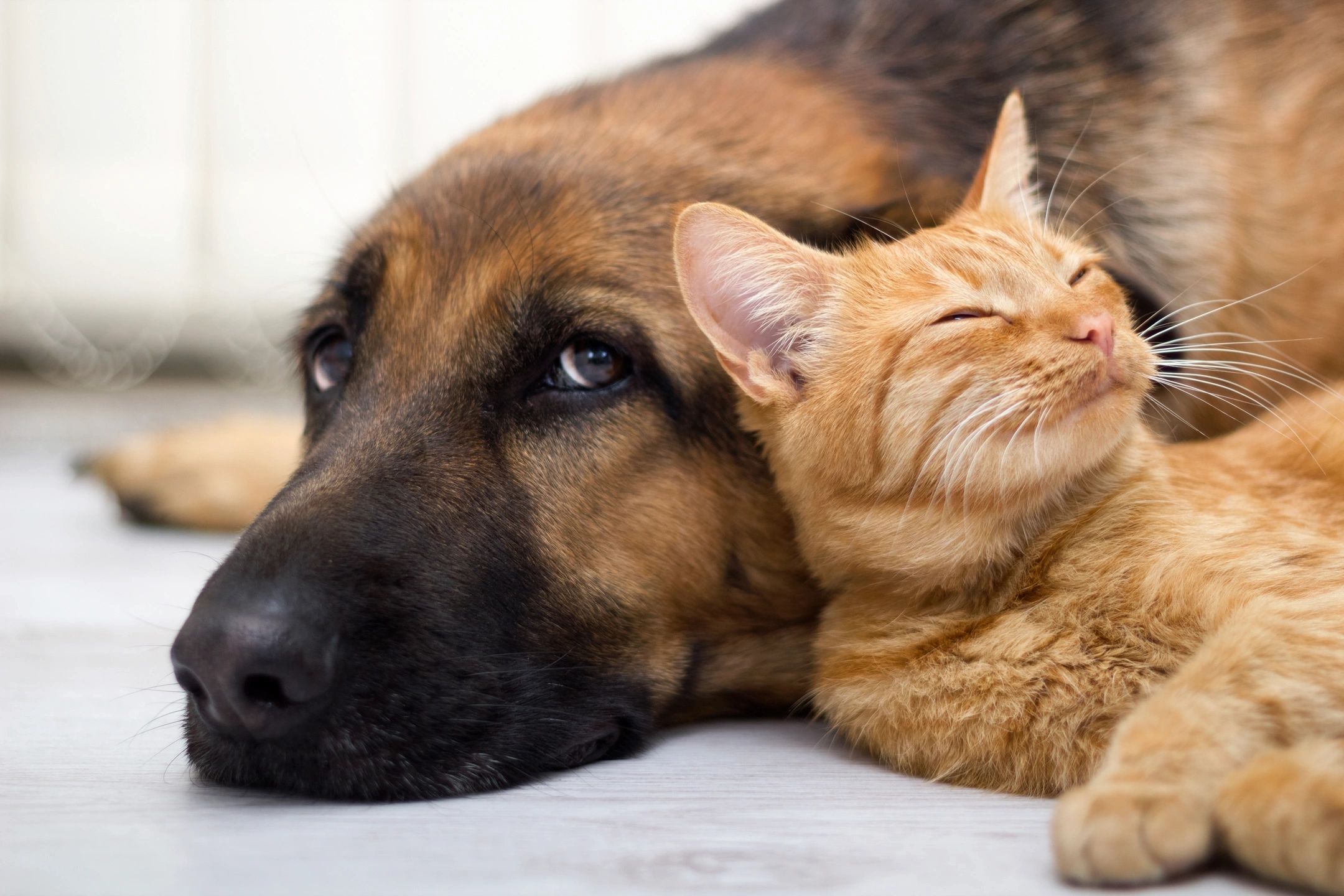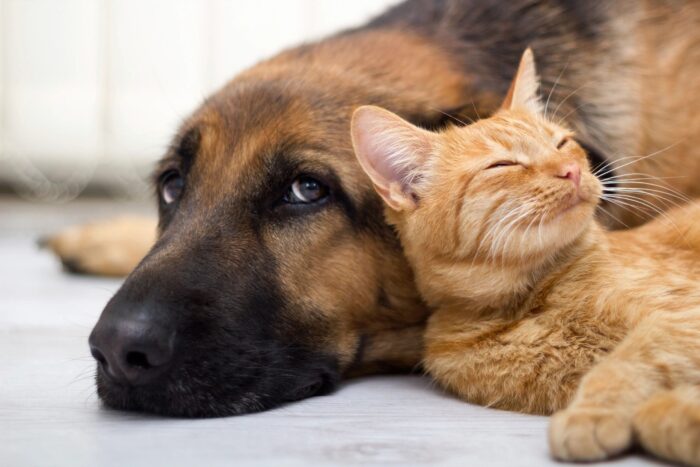Pets are Calming, Let’s Reciprocate


Anxiety is a condition that is common in both humans and domestic animals, who carry the same fight or flight instinct that we do. It can be related to a specific event or chronic condition that can be triggered by unanticipated situations. And this can lead to panic attacks, excessive barking, crying, howling, biting, scratching and destruction.
For our cats and dogs it could manifest in the form of accidents in the house, drooling, over sleeping, scratching or chewing, or persistent barking, to name a few. But first and foremost, it is critical to understand the source of your pet’s anxiety and to implement effective treatment. Fear or phobia manifest in a variety of ways, in either depressed, or more problematic, in aggressive and/or destructive behavior.
It is no secret that felines are uniquely sensitive creatures and that they are keenly aware of their environment. They operate under theirown terms and when they are not in control, even the smallest change in routine can be disruptive. A cat’s innate behavior exhibits a stealth, predatory physiology and hypersensitive hearing that protects them from danger in the wild, but may be the root of stress and anxiety in a domestic setting. And that often results in problematic behavioral issues.
Dogs, on the other hand, experience anxiety much like we do. The may be anxious when left alone or confined. They may overreact to loud noises, travel or changes in their environment. It may even be as focused as overreaction to certain objects, people or places that set them off. The difference is that, unlike people, dogs cannot verbally express their feelings, so they find other ways to express themselves; and usually not in a good way. That anxiety can become problematic, but there are natural remedies that can soothe and relax your canine.
Many of these sources of anxiety can improve through training and conditioning. However, some dogs are simply anxious by nature and need help calming down before they can even approach an effective training regimen. But before you consider pharmaceuticals for your pets, consider less contraindicative, natural resources.
Calmative herbs can be generally described as those that help relieve anxiety and bring about a calmer, more relaxed state of being. However, it’s important to realize that no two are entirely alike. Here is an explanation of the benefits of some herbs that address different manifestations of behavioral issues in dogs and cats.
Valerian Root (Valeriana officinalis) is an antispasmodic that contains saponins, which help relieve flatulence. Cats hold tension in their gut, so this herb is especially useful when high anxiety manifests in vomiting. Valerian Root tincture administered directly in their mouth will usually bring quick relief. Valerian Root also targets physical tension.
If your dog is terrified during thunderstorms or becomes anxious when left home alone, Valerian Root may offer relief. It is an herbal supplement with mild sedative qualities that humans have traditionally used to alleviate insomnia, stress, and anxiety. Integrative veterinarians also recommend it for their anxious canine patients. Valerian Root is not without its risks. Always watch for side effects, especially if your dog takes other medications or supplements. Not unlike human herb interaction, Valerian Root may not work as well for your dog as it might for the dog next door.
Catnip Leaf (Nepeta cataria) If your cat does not tolerate Valerian, which tends to heat up certain individuals, a similar dose of Catnip tincture may be a solution. Contrary to its reputation, the euphoric effects of Catnip only occur when aromatic elements from the herb activate the accessory olfactory system inside the nose. When ingested, Catnip does not induce euphoria, but rather serves as a general calming agent and relieves intestinal gas and bloating caused by gut tension.
Is catnip safe for dog? Yes! Not only is it safe, it is good for them. Catnip contains vitamins C and E, magnesium, flavonoids (phytonutrients), tannins, and essential oils. Like cats, some dogs do not respond to catnip but if they do, catnip has the opposite in dogs as it does in cats. For dogs, the herb acts as a mild sedative and can help with a variety of issues, such as nerves, indigestion, nausea and motion sickness. Catnip can also be used as a natural antiseptic because it contains both antibacterial and healing properties. For both dogs and cats, if they have a minor scrape, rub some fresh catnip tincture on it to heal the wound. In addition to repelling mosquitos, catnip has also proven to be a reliable flea deterrent, again, for both dogs and cats.
Lemon Balm (Melissa officinalis) offers similar benefits, to Valerian Root and Catnip that can calm the gut and induce a subtle calming effect. Some studies suggest that Lemon Balm may also help modulate an overactive thyroid (a common malady in many cats). Always consult your veterinarian if you suspect hyperthyroidism, as this can be a serious, even life-threatening health problem and Lemon Balm may also interfere with certain thyroid drugs.
Lemon balm is a non-toxic herb that can be used on dogs, cats, and even horses. As a supplement for your dog, Lemon Balm has many benefits that may help with several different conditions. Always, consult your veterinarian and use caution before substituting an herb like lemon balm for your pet’s medication.
Passionflower Leaf (Passiflora incarnata) best known for its natural calming properties, it used to ease the mind during bouts of jealousy, separation anxiety, fear or grieving. Passionflower has been used for medicinal purposes for many years and is completely safe for dogs and cats. If your pet suffers from anxiety, particularly separation anxiety, this is a natural remedy to ease their symptoms. It raises levels of gamma-aminobutyric acid in the brain, which lowers certain brain cell activity, putting the body in a calm and relaxed state. Passionflower also keeps levels of serotonin and dopamine high in the body, which, in turn, can increase your pet’s mood and improve their temperament. It has also been used as a stress reliever before surgery.
Skullcap, aka Scullcap (Scutellaria lateriflora) is a go-to herb for extreme nervousness when an animal is literally trembling with anxiety, or is hypersensitive to your touch. Skullcap can also work as a substitute for Valerian Root. Skullcap has also been used by some Veterinarians to reduce the intensity and frequency of epileptic seizures. Because there are many different species of Skullcap, be sure the variety you are using is Scutellaria laterifolia. Skullcap will calm your pet’s worries in the face of stressful events like vet visits and thunderstorms, and help them sleep.
California Poppy (Eschscholzia californica) This is a go-to herb when your cat’s anxiety is associated with pain. Cats tend to cope with pain by curling up and sleeping. Unlike opium poppy (Papaver somniferum), the California poppy does not contain any opiates, but does have some very mild opiate-like properties that make it useful for safely and reliably bringing comfort from pain. Use this herb in small frequent doses (about 5 drops) once every two hours until a restful state is established.
Small doses of California Poppy, when used for canines, will not make them completely nod out. Instead, it will relieve anxiety and tension, stabilize emotions and improve sleep patterns affected by excessive nervousness.
Before giving anything new to your cat or dog, including herbs, it is always a good idea to schedule a veterinary check-up to make sure their stress and anxiety are not caused by a physical problem. It is also important to consider how their diet may be contributing to their anxiety. Once their medical and nutritional concerns have been addressed, try a more natural solution for your pets over all well-being.
Tags: anxiety, barking, behavior, cats, dogs, pets
Comments are closed here.